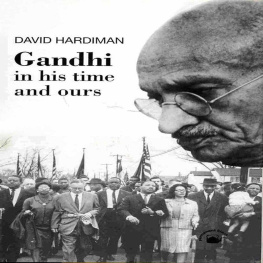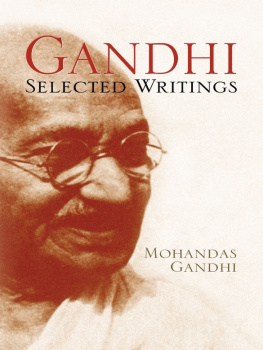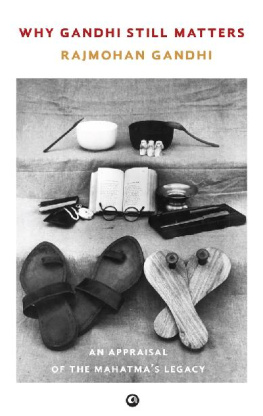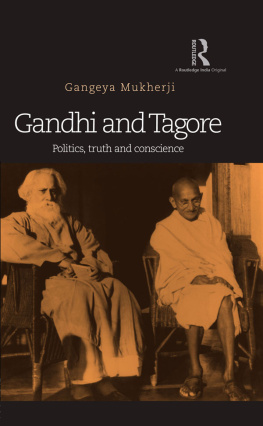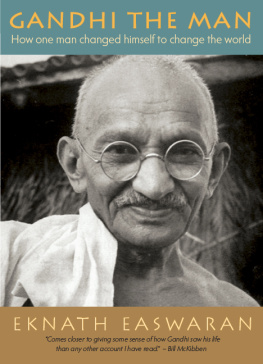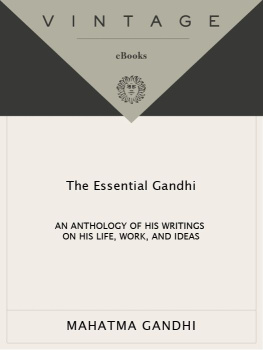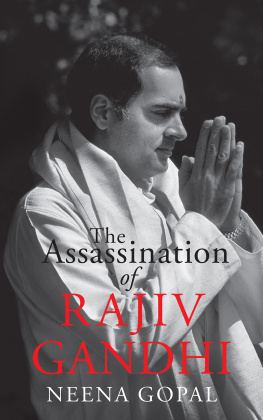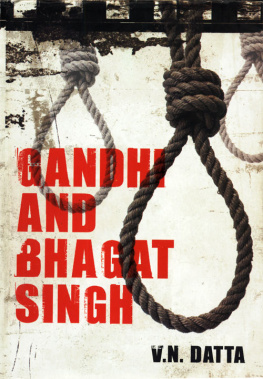David Hardiman - Gandhi:In His Time and Ours
Here you can read online David Hardiman - Gandhi:In His Time and Ours full text of the book (entire story) in english for free. Download pdf and epub, get meaning, cover and reviews about this ebook. year: 2013, publisher: Permanent Black, genre: Politics. Description of the work, (preface) as well as reviews are available. Best literature library LitArk.com created for fans of good reading and offers a wide selection of genres:
Romance novel
Science fiction
Adventure
Detective
Science
History
Home and family
Prose
Art
Politics
Computer
Non-fiction
Religion
Business
Children
Humor
Choose a favorite category and find really read worthwhile books. Enjoy immersion in the world of imagination, feel the emotions of the characters or learn something new for yourself, make an fascinating discovery.
- Book:Gandhi:In His Time and Ours
- Author:
- Publisher:Permanent Black
- Genre:
- Year:2013
- Rating:3 / 5
- Favourites:Add to favourites
- Your mark:
- 60
- 1
- 2
- 3
- 4
- 5
Gandhi:In His Time and Ours: summary, description and annotation
We offer to read an annotation, description, summary or preface (depends on what the author of the book "Gandhi:In His Time and Ours" wrote himself). If you haven't found the necessary information about the book — write in the comments, we will try to find it.
Gandhi:In His Time and Ours — read online for free the complete book (whole text) full work
Below is the text of the book, divided by pages. System saving the place of the last page read, allows you to conveniently read the book "Gandhi:In His Time and Ours" online for free, without having to search again every time where you left off. Put a bookmark, and you can go to the page where you finished reading at any time.
Font size:
Interval:
Bookmark:
In His Time and Ours
For our entire range of books please use search strings "Orient BlackSwan", "Universities Press India" and "Permanent Black" in store.
In His Time and Ours
DAVID HARDIMAN

Published by
PERMANENT BLACK
Himalayana, Mall Road, Ranikhet Cantt,
Ranikhet 263645
Distributed by
Orient Blackswan Private Limited
Registered Office
3-6-752 Himayatnagar, Hyderabad 500 029 (A.P.), INDIA
e-mail:
Other Offices
Bangalore, Bhopal, Bhubaneshwar, Chennai,
Ernakulam, Guwahati, Hyderabad, Jaipur, Kolkata,
Lucknow, Mumbai, New Delhi, Noida, Patna
Copyright Permanent Black 2003
eISBN 978 81 7824 428 0
e-edition:First Published 2013
ePUB Conversion: .
All rights reserved. No part of this publication may be reproduced, distributed, or transmitted in any form or by any means, including photocopying, recording, or other electronic or mechanical methods, without the prior written permission of the publisher, except in the case of brief quotations embodied in critical reviews and certain other noncommercial uses permitted by copyright law. For permission requests write to the publisher.
In memory of
John Hardiman
(19162000)
and
Harshad Trivedy
(19312001)
Contents
Preface
In this book I examine Gandhi's legacy as the creator and advocate of a radical style of politics that fought the many insidious divides found in his own and other societies. Political culturesboth democratic and authoritarianhave had a tendency to give rise to a populist demonising of people who are considered to be 'different' in one way or another. This may be directed against an external enemy, or it may be engaged within a society against minorities or those who lack social and political power. Often, though not necessarily, it is associated with a chauvinistic nationalism. Many examples may be cited, of which the case of Nazi Germany is only the most striking. In India, in Gandhi's own time, Hindu extremists spouted a hate-filled bombast against Muslims and Christians, who were depicted as 'traitors' and 'anti-nationalist'. Separatist Muslims countered them, demanding their own nation statePakistan. This led to inter-community strife and a series of tragic massacres.
This divisive politics had, and continues to have, several features. It involves defining an antagonistan 'other'who is seen to stand apart from the community to which the self' is perceived to belong. The difference might be perceived as religious, ethnic, racial or caste-based. It might target a minority or an assertive lower social class or community that 'needs to be taught its place'. All members of the 'other' community are seen to be culpable, and all may become objects of what is held to be a legitimate attack, regardless of any particular individual attitude or loyalty. Such enmity might also be directed against an occupying or colonial power that is defined on racial, religious and other such grounds, leading to terrorist attacks that are fuelled as much by a spirit of hatred and revenge as by any tactical need in what might well be an otherwise legitimate struggle. Debate and discussion with the 'other' is avoided lest it compromise the resolve to eliminate. The aim is always to bring about a polarisation of sentiment, leaving no middle ground between 'self' and 'other'.
Gandhi, I argue in this book, resisted such a politics with his whole being. He refused to accept the validity of such divides, arguing that humans everywhere share much in common, and that there are always grounds for a fruitful dialogue that can lead to a resolution of conflicts and a breaking down of difference. He resisted nationalists who preached hatred against the coloniser and who tried to assert a warped sense of masculinity through assassinations and terror-bombings. Instead, he validated what he depicted as 'feminine' principles of non-violent opposition and civility. He insisted that Britishers were welcome to stay in India if they relinquished their domineering and exploitative sovereignty and applied their many talents to improving Indian society in harmony with Indian sentiments. He forged a method of resistance that sought to build bridges with an opponent, while at the same time refusing to accept injustice. He directed a powerful spotlight on the injustices that ran through his own society, such as the practice of untouchability and the exploitation of low-caste and 'tribal' groups by the high castes, and he fought these abuses with great energy and commitment. He abhorred conflict based on the hatred of one religious group for another, seeing it as a negation of all that he defined as 'religion'. He was disgusted by Christian missionaries who railed against Hindu 'superstition' and 'idolatry', as well as by Hindus and Muslims who attacked one another for various alleged violations of their religious sentiments.
In resisting such polarities, Gandhi put his life on the line, and in the end was assassinated by a votary of the politics that he abhorred. In the process, he forged a method of moral activism that was to provide a beacon for many women and men in subsequent years. Such people, in speaking what they believed to be the truth to those in power and in fighting injustice through non-violent civil resistance, have also laid their lives on the line, and they have suffered and sometimes died for their principles. The final three chapters of this book examine Gandhi's legacy in this respect, both in India and on a global stage.
The book began as a result of a suggestion from Ramachandra Guha that I write a book on 'Gandhism in the Twentieth Century'. I took up the idea because I felt that Gandhi's beliefs, practice and legacy were due for reassessment in the light of many disturbing developments that had occurred during the 1990s both in India and the world, and no more so than in Gandhi's home region of Gujarat, where Hindu chauvinists carried out murderous attacks on Muslims in 1992. The events of 2002 in Gujaratwhen the same elements launched a carefully planned pogrom against Muslims, and then months later swept the polls in the state elections through playing on fears of 'Muslim terrorism'have strongly reinforced my feelings in this respect.
For reading and commenting on the manuscript, I would like to thank David Arnold, Ramachandra Guha, Gyanendra Pandey, Parita Mukta, Mahesh Rangarajan, Ajay Skaria; for the editing, Rukun Advani; and for invaluable help with my research in India, Kanu Bhavsar.
While I was writing this book, and within the space of less than two years, my father, John Hardiman, and my father-in-law, HarshadbTrivedy, died. Both, in their own and very different ways, put into practice their admirable visions of public and private civility. I dedicate this book to the memory of them both.
Note: The references to Collected Works of Mahatma Gandhi (CWMG) are from Mahatma Gandhi: Electronic Book (CD Rom version of CWMG), Publications Division, New Delhi 1999. The version of the CWMG used for this CD Rom differs from some of the earlier versions of CWMG,
Font size:
Interval:
Bookmark:
Similar books «Gandhi:In His Time and Ours»
Look at similar books to Gandhi:In His Time and Ours. We have selected literature similar in name and meaning in the hope of providing readers with more options to find new, interesting, not yet read works.
Discussion, reviews of the book Gandhi:In His Time and Ours and just readers' own opinions. Leave your comments, write what you think about the work, its meaning or the main characters. Specify what exactly you liked and what you didn't like, and why you think so.

